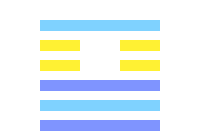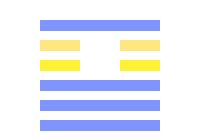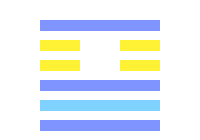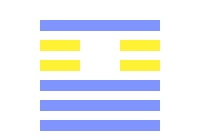Hexagramme 26 du Yi Jing - Trait 3
L'hexagramme : 26
Un hexagramme est une combinaison de six traits yin et yang.

26.3 (26 > 41) - THE TÂ KHÛ HEXAGRAM.
The third line, undivided, shows its subject urging his way with good horses. It will be advantageous for him to realise the difficulty (of his course), and to be firm and correct, exercising himself daily in his charioteering and methods of defence; then there will be advantage in whatever direction he may advance.
Bing DeepL Google Yandex26.3 (26 > 41) - Following one's partner
One is accompanied by someone who is pursuing the same goal.
Bing DeepL Google Yandex26.3 (26 > 41) - Following one's partner
One is accompanied by someone who is pursuing the same goal.
Bing DeepL Google Yandex26.3 (26 > 41) - Tá tchu, le pouvoir contraignant de la grandeur
Tá tchu : 1. Grand entretien ; 2. Dompter, conduire
Celui qui chemine avec des chevaux bien entretenus, sortira heureusement des difficultés. S’il s’exerce chaque jour à conduire et combattre, tout réussira pour lui. (Suite de la bonne éducation.)
Bing DeepL Google Yandex26.3 (26 > 41) - Suivre son partenaire
On est accompagné par quelqu'un qui poursuit le même but.
Bing DeepL Google YandexLes trigrammes
Les trigrammes sont des combinaisons de trois traits yin et yang. Dans l'hexagramme, les trois traits du dessous constituent le trigramme inférieur et représentent la situation intérieure. Les trois lignes du haut constituent le trigramme supérieur et représentent la situation extérieure.
trigSup

Trigramme inférieur : Le ciel Le lac


L'hexagramme nucléaire : 54.2.4 (54 > 24)
L'hexagramme nucléaire est l'association des deux trigrammes intérieurs (traits 2,3,4 et 3,4,5). Il représente la racine, ou l'origine de la situation.

54.2.4 (54 > 24) - THE KWEI MEI HEXAGRAM.
- 2. The second line, undivided, shows her blind of one eye, and yet able to see. There will be advantage in her maintaining the firm correctness of a solitary widow.
- 4. The fourth line, undivided, shows the younger sister who is to be married off protracting the time. She may be late in being married, but the time will come.
54.2.4 (54 > 24) - Assistance
One takes away from others their taste for diversity.
Bing DeepL Google Yandex54.2.4 (54 > 24) - Assistance
One takes away from others their taste for diversity.
Bing DeepL Google Yandex54.2.4 (54 > 24) - Kvêi Mei, la fille à marier
Kvêi-Mei : marier une jeune sœur, une jeune fille.
- 2. Elle est comme un borgne qui voit encore, mais mal (qui ne voit d’un œil). [Il lui sera avantageux de vivre retirée et ferme en sa vertu, de ne point faillir aux règles du devoir.]
- 4. La jeune fille à marier cherche à retarder le moment. [Modeste, elle n’a pas hâte de suivre un homme.] Mais bien qu’elle retarde son mariage, le moment viendra malgré tout. [Malgré tout, cela se fera.]
54.2.4 (54 > 24) - L'assistance
On enlève aux autres leur goût de la variété.
Bing DeepL Google Yandex54.2.4 (54 > 24) - Támogatás
- 2. Ha nem segítenek, otthagyhatja őket.
- 4. Fel akarja készíteni magukat.
Le dérivé (Fan Yao) : 41.3
Le même trait sur l'hexagramme après la mutation. Il représente ce qui peut être fait APRÈS pour corriger la situation décrite par ce trait, un peu comme un remède ou une solution.

41.3 (41 > 26) - THE SUN HEXAGRAM.
The third line, divided, shows how of three men walking together, the number is diminished by one ; and how one, walking, finds his friend.
Bing DeepL Google Yandex41.3 (41 > 26) - Sùn, la diminution
Sùn : diminuer, abaisser, réprimer
Si trois hommes marchent ensemble, qu’un d’eux quitte ses compagnons et l’homme qui vient seul après eux en trouvera un. (Ainsi il y aura deux couples d’amis.)
Quand trois hommes sont ensemble, il y a des différends, des soupçons.
Note. Litt. : diminuer d’un homme, sùn yih zhīn, pour éviter les querelles.
La jointure: 42.4
Le dérivé du réciproque. Il représente ce qui aurait pu être fait AVANT pour prévenir la situation décrite par ce trait, un peu comme un remède ou une solution.

42.4 (42 > 25) - THE YÎ HEXAGRAM.
The fourth line, divided, shows its subject pursuing the due course. His advice to his prince is followed. He can with advantage be relied on in such a movement as that of removing the capital.
Bing DeepL Google Yandex42.4 (42 > 25) - Being dissatisfied
When one needs something else one can recognise it.
Bing DeepL Google Yandex42.4 (42 > 25) - Being dissatisfied
When one needs something else one can recognize it.
Bing DeepL Google Yandex42.4 (42 > 25) - Yî, l’accroissement
Yī : augmenter, agrandir, enrichir, s’élever, grandir.
Si le ministre agit avec droiture, les avis qu’il donnera au roi seront suivis avantageusement, même dans les cas les plus graves tels que celui du transfert de la capitale.
Ses avis ont pour but l’accroissement de la prospérité.
42.4 (42 > 25) - Être insatisfait
Quand on a besoin d'autre chose on peut le reconnaître.
Bing DeepL Google YandexLe réciproque : 25.4
L'hexagramme renversé. Il représente la situation opposée, et en tant que tel est essentiel pour la validation des commentaires.

25.4 (25 > 42) - THE WÛ WANG HEXAGRAM.
The fourth line, undivided, shows (a case) in which, if its subject can remain firm and correct, there will be no error.
Bing DeepL Google Yandex25.4 (25 > 42) - Wu wâng, l’innocence, l’imprévu
Wu wāng : sans blâme, irréprochable, honnête.
La bonne conduite (seule) peut prospérer sans revers.
Elle aura une prospérité sûre.
Mutations

26.3 (26 > 41) - THE TÂ KHÛ HEXAGRAM.
The third line, undivided, shows its subject urging his way with good horses. It will be advantageous for him to realise the difficulty (of his course), and to be firm and correct, exercising himself daily in his charioteering and methods of defence; then there will be advantage in whatever direction he may advance.
Bing DeepL Google Yandex26.3 (26 > 41) - Following one's partner
One is accompanied by someone who is pursuing the same goal.
Bing DeepL Google Yandex26.3 (26 > 41) - Following one's partner
One is accompanied by someone who is pursuing the same goal.
Bing DeepL Google Yandex26.3 (26 > 41) - Tá tchu, le pouvoir contraignant de la grandeur
Tá tchu : 1. Grand entretien ; 2. Dompter, conduire
Celui qui chemine avec des chevaux bien entretenus, sortira heureusement des difficultés. S’il s’exerce chaque jour à conduire et combattre, tout réussira pour lui. (Suite de la bonne éducation.)
Bing DeepL Google Yandex26.3 (26 > 41) - Suivre son partenaire
On est accompagné par quelqu'un qui poursuit le même but.
Bing DeepL Google Yandex
26.1.3 (26 > 4) - THE TÂ KHÛ HEXAGRAM.
- 1. The first line, undivided, shows its subject in a position of peril. It will be advantageous for him to stop his advance.
- 3. The third line, undivided, shows its subject urging his way with good horses. It will be advantageous for him to realise the difficulty (of his course), and to be firm and correct, exercising himself daily in his charioteering and methods of defence; then there will be advantage in whatever direction he may advance.
26.1.3 (26 > 4) - Lacking teachers
One would like to receive a sound advice but others are not qualified enough.
Bing DeepL Google Yandex26.1.3 (26 > 4) - Lacking teachers
One would like to receive a sound advice but others are not qualified enough.
Bing DeepL Google Yandex26.1.3 (26 > 4) - Tá tchu, le pouvoir contraignant de la grandeur
Tá tchu : 1. Grand entretien ; 2. Dompter, conduire
- 1. Quand il survient quelque danger, il est bon de s’arrêter (se vaincre), de céder aux circonstances et de ne point vouloir l’emporter de force.
- 3. Celui qui chemine avec des chevaux bien entretenus, sortira heureusement des difficultés. S’il s’exerce chaque jour à conduire et combattre, tout réussira pour lui. (Suite de la bonne éducation.)
26.1.3 (26 > 4) - Manquer de professeurs
On souhaite recevoir un avis éclairé mais les autres ne sont pas suffisamment compétents.
Bing DeepL Google Yandex26.1.3 (26 > 4) - Ellenőrzés
- 1. Nem akar menni és azonnal megnézni mert nem olyan fontos.
- 3. Elkíséri.

26.2.3 (26 > 27) - THE TÂ KHÛ HEXAGRAM.
- 2. The second line, undivided, shows a carriage with the strap under it removed.
- 3. The third line, undivided, shows its subject urging his way with good horses. It will be advantageous for him to realise the difficulty (of his course), and to be firm and correct, exercising himself daily in his charioteering and methods of defence; then there will be advantage in whatever direction he may advance.
26.2.3 (26 > 27) - Tá tchu, le pouvoir contraignant de la grandeur
Tá tchu : 1. Grand entretien ; 2. Dompter, conduire
- 2. (Comme, par exemple, quand) un char a perdu le cuir qui le maintient en place (droit).
- 3. Celui qui chemine avec des chevaux bien entretenus, sortira heureusement des difficultés. S’il s’exerce chaque jour à conduire et combattre, tout réussira pour lui. (Suite de la bonne éducation.)
26.2.3 (26 > 27) - Avoir le nez dans le guidon
On épluche des légumes à longueur de journée.
Bing DeepL Google Yandex26.2.3 (26 > 27) - Ellenőrzés
- 2. Otthagyja mert nem bíznak benne.
- 3. Elkíséri.

26.1.2.3 (26 > 23) - THE TÂ KHÛ HEXAGRAM.
- 1. The first line, undivided, shows its subject in a position of peril. It will be advantageous for him to stop his advance.
- 2. The second line, undivided, shows a carriage with the strap under it removed.
- 3. The third line, undivided, shows its subject urging his way with good horses. It will be advantageous for him to realise the difficulty (of his course), and to be firm and correct, exercising himself daily in his charioteering and methods of defence; then there will be advantage in whatever direction he may advance.
26.1.2.3 (26 > 23) - Doing as before
One refuses to see other offers until being convinced that the first proposals are not viable.
Bing DeepL Google Yandex26.1.2.3 (26 > 23) - Doing as before
One refuses to see other offers until being convinced that the first proposals are not viable.
Bing DeepL Google Yandex26.1.2.3 (26 > 23) - Tá tchu, le pouvoir contraignant de la grandeur
Tá tchu : 1. Grand entretien ; 2. Dompter, conduire
- 1. Quand il survient quelque danger, il est bon de s’arrêter (se vaincre), de céder aux circonstances et de ne point vouloir l’emporter de force.
- 2. (Comme, par exemple, quand) un char a perdu le cuir qui le maintient en place (droit).
- 3. Celui qui chemine avec des chevaux bien entretenus, sortira heureusement des difficultés. S’il s’exerce chaque jour à conduire et combattre, tout réussira pour lui. (Suite de la bonne éducation.)
26.1.2.3 (26 > 23) - Faire comme avant
On refuse de voir d'autres offres avant d'avoir été convaincu de la non-viabilité des premières propositions.
Bing DeepL Google Yandex26.1.2.3 (26 > 23) - Ellenőrzés
- 1. Nem akar menni és azonnal megnézni mert nem olyan fontos.
- 2. Otthagyja mert nem bíznak benne.
- 3. Elkíséri.

26.3.4 (26 > 38) - THE TÂ KHÛ HEXAGRAM.
- 3. The third line, undivided, shows its subject urging his way with good horses. It will be advantageous for him to realise the difficulty (of his course), and to be firm and correct, exercising himself daily in his charioteering and methods of defence; then there will be advantage in whatever direction he may advance.
- 4. The fourth line, divided, shows the young bull, (and yet) having the piece of wood over his horns. There will be great good fortune.
26.3.4 (26 > 38) - Promote one's wards
One assigns one's best student to an assistant position.
Bing DeepL Google Yandex26.3.4 (26 > 38) - Promote one's wards
One assigns one's best student to an assistant position.
Bing DeepL Google Yandex26.3.4 (26 > 38) - Tá tchu, le pouvoir contraignant de la grandeur
Tá tchu : 1. Grand entretien ; 2. Dompter, conduire
- 3. Celui qui chemine avec des chevaux bien entretenus, sortira heureusement des difficultés. S’il s’exerce chaque jour à conduire et combattre, tout réussira pour lui. (Suite de la bonne éducation.)
- 4. Le joug, la planchette que porte le jeune boeuf est d’un usage très heureux pour le dompter et le former au labourage (second sens).
26.3.4 (26 > 38) - Promouvoir ses pupilles
On affecte son meilleur élève à un poste d'assistant.
Bing DeepL Google Yandex26.3.4 (26 > 38) - Ellenőrzés
- 3. Elkíséri.
- 4. A másik erőszakosságának kezelése adakozással.

26.1.3.4 (26 > 64) - THE TÂ KHÛ HEXAGRAM.
- 1. The first line, undivided, shows its subject in a position of peril. It will be advantageous for him to stop his advance.
- 3. The third line, undivided, shows its subject urging his way with good horses. It will be advantageous for him to realise the difficulty (of his course), and to be firm and correct, exercising himself daily in his charioteering and methods of defence; then there will be advantage in whatever direction he may advance.
- 4. The fourth line, divided, shows the young bull, (and yet) having the piece of wood over his horns. There will be great good fortune.
26.1.3.4 (26 > 64) - Knowing how to proceed
One knows the principles by which one must act.
Bing DeepL Google Yandex26.1.3.4 (26 > 64) - Knowing how to proceed
One knows the principles by which one must act.
Bing DeepL Google Yandex26.1.3.4 (26 > 64) - Tá tchu, le pouvoir contraignant de la grandeur
Tá tchu : 1. Grand entretien ; 2. Dompter, conduire
- 1. Quand il survient quelque danger, il est bon de s’arrêter (se vaincre), de céder aux circonstances et de ne point vouloir l’emporter de force.
- 3. Celui qui chemine avec des chevaux bien entretenus, sortira heureusement des difficultés. S’il s’exerce chaque jour à conduire et combattre, tout réussira pour lui. (Suite de la bonne éducation.)
- 4. Le joug, la planchette que porte le jeune boeuf est d’un usage très heureux pour le dompter et le former au labourage (second sens).
26.1.3.4 (26 > 64) - Connaître la procédure
On connait les principes selon lesquels il faut agir.
Bing DeepL Google Yandex26.1.3.4 (26 > 64) - Ellenőrzés
- 1. Nem akar menni és azonnal megnézni mert nem olyan fontos.
- 3. Elkíséri.
- 4. A másik erőszakosságának kezelése adakozással.

26.2.3.4 (26 > 21) - THE TÂ KHÛ HEXAGRAM.
- 2. The second line, undivided, shows a carriage with the strap under it removed.
- 3. The third line, undivided, shows its subject urging his way with good horses. It will be advantageous for him to realise the difficulty (of his course), and to be firm and correct, exercising himself daily in his charioteering and methods of defence; then there will be advantage in whatever direction he may advance.
- 4. The fourth line, divided, shows the young bull, (and yet) having the piece of wood over his horns. There will be great good fortune.
26.2.3.4 (26 > 21) - Running out of time
One regrets lacking of time to do what one would have liked.
Bing DeepL Google Yandex26.2.3.4 (26 > 21) - Running out of time
One regrets lacking of time to do what one would have liked.
Bing DeepL Google Yandex26.2.3.4 (26 > 21) - Tá tchu, le pouvoir contraignant de la grandeur
Tá tchu : 1. Grand entretien ; 2. Dompter, conduire
- 2. (Comme, par exemple, quand) un char a perdu le cuir qui le maintient en place (droit).
- 3. Celui qui chemine avec des chevaux bien entretenus, sortira heureusement des difficultés. S’il s’exerce chaque jour à conduire et combattre, tout réussira pour lui. (Suite de la bonne éducation.)
- 4. Le joug, la planchette que porte le jeune boeuf est d’un usage très heureux pour le dompter et le former au labourage (second sens).
26.2.3.4 (26 > 21) - Manquer de temps
On regrette de ne pas avoir eu le temps de faire ce qu'on aurait voulu.
Bing DeepL Google Yandex26.2.3.4 (26 > 21) - Ellenőrzés
- 2. Otthagyja mert nem bíznak benne.
- 3. Elkíséri.
- 4. A másik erőszakosságának kezelése adakozással.

26.1.2.3.4 (26 > 35) - THE TÂ KHÛ HEXAGRAM.
- 1. The first line, undivided, shows its subject in a position of peril. It will be advantageous for him to stop his advance.
- 2. The second line, undivided, shows a carriage with the strap under it removed.
- 3. The third line, undivided, shows its subject urging his way with good horses. It will be advantageous for him to realise the difficulty (of his course), and to be firm and correct, exercising himself daily in his charioteering and methods of defence; then there will be advantage in whatever direction he may advance.
- 4. The fourth line, divided, shows the young bull, (and yet) having the piece of wood over his horns. There will be great good fortune.
26.1.2.3.4 (26 > 35) - Having the required capacities
One knows the ways and means by which one can succeed in doing what was planned.
Bing DeepL Google Yandex26.1.2.3.4 (26 > 35) - Having the required capacities
One knows the ways and means by which one can succeed in doing what was planned.
Bing DeepL Google Yandex26.1.2.3.4 (26 > 35) - Tá tchu, le pouvoir contraignant de la grandeur
Tá tchu : 1. Grand entretien ; 2. Dompter, conduire
- 1. Quand il survient quelque danger, il est bon de s’arrêter (se vaincre), de céder aux circonstances et de ne point vouloir l’emporter de force.
- 2. (Comme, par exemple, quand) un char a perdu le cuir qui le maintient en place (droit).
- 3. Celui qui chemine avec des chevaux bien entretenus, sortira heureusement des difficultés. S’il s’exerce chaque jour à conduire et combattre, tout réussira pour lui. (Suite de la bonne éducation.)
- 4. Le joug, la planchette que porte le jeune boeuf est d’un usage très heureux pour le dompter et le former au labourage (second sens).
26.1.2.3.4 (26 > 35) - Avoir les capacités requises
On connaît les voies et les moyens par lesquels on peut réussir à faire ce qu'on avait prévu.
Bing DeepL Google Yandex26.1.2.3.4 (26 > 35) - Ellenőrzés
- 1. Nem akar menni és azonnal megnézni mert nem olyan fontos.
- 2. Otthagyja mert nem bíznak benne.
- 3. Elkíséri.
- 4. A másik erőszakosságának kezelése adakozással.

26.3.5 (26 > 61) - THE TÂ KHÛ HEXAGRAM.
- 3. The third line, undivided, shows its subject urging his way with good horses. It will be advantageous for him to realise the difficulty (of his course), and to be firm and correct, exercising himself daily in his charioteering and methods of defence; then there will be advantage in whatever direction he may advance.
- 5. The fifth line, divided, shows the teeth of a castrated hog. There will be good fortune.
26.3.5 (26 > 61) - Having an impediment
One is dying to not be able to do what one had planned previously.
26.3.5 (26 > 61) - Having an impediment
One is dying to not be able to do what one had planned previously.
26.3.5 (26 > 61) - Tá tchu, le pouvoir contraignant de la grandeur
Tá tchu : 1. Grand entretien ; 2. Dompter, conduire
- 3. Celui qui chemine avec des chevaux bien entretenus, sortira heureusement des difficultés. S’il s’exerce chaque jour à conduire et combattre, tout réussira pour lui. (Suite de la bonne éducation.)
- 5. Lorsqu’un sanglier est châtré, dompté, ses défenses sont exemptes de danger (et sont plutôt un instrument utile). — Arracher les dents à un sanglier, c’est priver un méchant des moyens de nuire.
26.3.5 (26 > 61) - Avoir un empêchement
On étouffe de ne pas pouvoir faire ce qu'on avait prévu de prime abord.
Bing DeepL Google Yandex26.3.5 (26 > 61) - Ellenőrzés
- 3. Elkíséri.
- 5. Vár amíg a legfiatalabb visszatér javítani.

26.1.3.5 (26 > 59) - THE TÂ KHÛ HEXAGRAM.
- 1. The first line, undivided, shows its subject in a position of peril. It will be advantageous for him to stop his advance.
- 3. The third line, undivided, shows its subject urging his way with good horses. It will be advantageous for him to realise the difficulty (of his course), and to be firm and correct, exercising himself daily in his charioteering and methods of defence; then there will be advantage in whatever direction he may advance.
- 5. The fifth line, divided, shows the teeth of a castrated hog. There will be good fortune.
26.1.3.5 (26 > 59) - Setting a precedent
One cultivates a certain ability to do what others do not dare to try.
Bing DeepL Google Yandex26.1.3.5 (26 > 59) - Setting a precedent
One cultivates a certain ability to do what others do not dare to try.
Bing DeepL Google Yandex26.1.3.5 (26 > 59) - Tá tchu, le pouvoir contraignant de la grandeur
Tá tchu : 1. Grand entretien ; 2. Dompter, conduire
- 1. Quand il survient quelque danger, il est bon de s’arrêter (se vaincre), de céder aux circonstances et de ne point vouloir l’emporter de force.
- 3. Celui qui chemine avec des chevaux bien entretenus, sortira heureusement des difficultés. S’il s’exerce chaque jour à conduire et combattre, tout réussira pour lui. (Suite de la bonne éducation.)
- 5. Lorsqu’un sanglier est châtré, dompté, ses défenses sont exemptes de danger (et sont plutôt un instrument utile). — Arracher les dents à un sanglier, c’est priver un méchant des moyens de nuire.
26.1.3.5 (26 > 59) - Créer un précédent
On cultive une certaine habileté à faire ce que les autres n'osent pas tenter.
Bing DeepL Google Yandex26.1.3.5 (26 > 59) - Ellenőrzés
- 1. Nem akar menni és azonnal megnézni mert nem olyan fontos.
- 3. Elkíséri.
- 5. Vár amíg a legfiatalabb visszatér javítani.

26.2.3.5 (26 > 42) - THE TÂ KHÛ HEXAGRAM.
- 2. The second line, undivided, shows a carriage with the strap under it removed.
- 3. The third line, undivided, shows its subject urging his way with good horses. It will be advantageous for him to realise the difficulty (of his course), and to be firm and correct, exercising himself daily in his charioteering and methods of defence; then there will be advantage in whatever direction he may advance.
- 5. The fifth line, divided, shows the teeth of a castrated hog. There will be good fortune.
26.2.3.5 (26 > 42) - Respecting those who care
One does not kill those who can heal one's best friends.
Bing DeepL Google Yandex26.2.3.5 (26 > 42) - Respecting those who care
One does not kill those who can heal one's best friends.
Bing DeepL Google Yandex26.2.3.5 (26 > 42) - Tá tchu, le pouvoir contraignant de la grandeur
Tá tchu : 1. Grand entretien ; 2. Dompter, conduire
- 2. (Comme, par exemple, quand) un char a perdu le cuir qui le maintient en place (droit).
- 3. Celui qui chemine avec des chevaux bien entretenus, sortira heureusement des difficultés. S’il s’exerce chaque jour à conduire et combattre, tout réussira pour lui. (Suite de la bonne éducation.)
- 5. Lorsqu’un sanglier est châtré, dompté, ses défenses sont exemptes de danger (et sont plutôt un instrument utile). — Arracher les dents à un sanglier, c’est priver un méchant des moyens de nuire.
26.2.3.5 (26 > 42) - Respecter ceux qui soignent
On ne tue pas ceux qui peuvent guérir ses meilleurs amis.
Bing DeepL Google Yandex26.2.3.5 (26 > 42) - Ellenőrzés
- 2. Otthagyja mert nem bíznak benne.
- 3. Elkíséri.
- 5. Vár amíg a legfiatalabb visszatér javítani.

26.1.2.3.5 (26 > 20) - THE TÂ KHÛ HEXAGRAM.
- 1. The first line, undivided, shows its subject in a position of peril. It will be advantageous for him to stop his advance.
- 2. The second line, undivided, shows a carriage with the strap under it removed.
- 3. The third line, undivided, shows its subject urging his way with good horses. It will be advantageous for him to realise the difficulty (of his course), and to be firm and correct, exercising himself daily in his charioteering and methods of defence; then there will be advantage in whatever direction he may advance.
- 5. The fifth line, divided, shows the teeth of a castrated hog. There will be good fortune.
26.1.2.3.5 (26 > 20) - Tracing anomalies
One checks that the others did not arrive at the wrong place.
Bing DeepL Google Yandex26.1.2.3.5 (26 > 20) - Tracing anomalies
One checks that the others did not arrive at the wrong place.
Bing DeepL Google Yandex26.1.2.3.5 (26 > 20) - Tá tchu, le pouvoir contraignant de la grandeur
Tá tchu : 1. Grand entretien ; 2. Dompter, conduire
- 1. Quand il survient quelque danger, il est bon de s’arrêter (se vaincre), de céder aux circonstances et de ne point vouloir l’emporter de force.
- 2. (Comme, par exemple, quand) un char a perdu le cuir qui le maintient en place (droit).
- 3. Celui qui chemine avec des chevaux bien entretenus, sortira heureusement des difficultés. S’il s’exerce chaque jour à conduire et combattre, tout réussira pour lui. (Suite de la bonne éducation.)
- 5. Lorsqu’un sanglier est châtré, dompté, ses défenses sont exemptes de danger (et sont plutôt un instrument utile). — Arracher les dents à un sanglier, c’est priver un méchant des moyens de nuire.
26.1.2.3.5 (26 > 20) - Retracer les anomalies
On vérifie que les autres ne sont pas arrivés au mauvais endroit.
Bing DeepL Google Yandex26.1.2.3.5 (26 > 20) - Ellenőrzés
- 1. Nem akar menni és azonnal megnézni mert nem olyan fontos.
- 2. Otthagyja mert nem bíznak benne.
- 3. Elkíséri.
- 5. Vár amíg a legfiatalabb visszatér javítani.

26.3.4.5 (26 > 10) - THE TÂ KHÛ HEXAGRAM.
- 3. The third line, undivided, shows its subject urging his way with good horses. It will be advantageous for him to realise the difficulty (of his course), and to be firm and correct, exercising himself daily in his charioteering and methods of defence; then there will be advantage in whatever direction he may advance.
- 4. The fourth line, divided, shows the young bull, (and yet) having the piece of wood over his horns. There will be great good fortune.
- 5. The fifth line, divided, shows the teeth of a castrated hog. There will be good fortune.
26.3.4.5 (26 > 10) - Knowing how to keep up with the vogue
One sees that things are evolving very quickly so one changes with them.
Bing DeepL Google Yandex26.3.4.5 (26 > 10) - Knowing how to keep up with the vogue
One sees that things are evolving very quickly so one changes with them.
Bing DeepL Google Yandex26.3.4.5 (26 > 10) - Tá tchu, le pouvoir contraignant de la grandeur
Tá tchu : 1. Grand entretien ; 2. Dompter, conduire
- 3. Celui qui chemine avec des chevaux bien entretenus, sortira heureusement des difficultés. S’il s’exerce chaque jour à conduire et combattre, tout réussira pour lui. (Suite de la bonne éducation.)
- 4. Le joug, la planchette que porte le jeune boeuf est d’un usage très heureux pour le dompter et le former au labourage (second sens).
- 5. Lorsqu’un sanglier est châtré, dompté, ses défenses sont exemptes de danger (et sont plutôt un instrument utile). — Arracher les dents à un sanglier, c’est priver un méchant des moyens de nuire.
26.3.4.5 (26 > 10) - Savoir suivre l'air du temps
On voit que les choses évoluent à vive allure alors on change avec elles.
Bing DeepL Google Yandex26.3.4.5 (26 > 10) - Ellenőrzés
- 3. Elkíséri.
- 4. A másik erőszakosságának kezelése adakozással.
- 5. Vár amíg a legfiatalabb visszatér javítani.

26.1.3.4.5 (26 > 6) - THE TÂ KHÛ HEXAGRAM.
- 1. The first line, undivided, shows its subject in a position of peril. It will be advantageous for him to stop his advance.
- 3. The third line, undivided, shows its subject urging his way with good horses. It will be advantageous for him to realise the difficulty (of his course), and to be firm and correct, exercising himself daily in his charioteering and methods of defence; then there will be advantage in whatever direction he may advance.
- 4. The fourth line, divided, shows the young bull, (and yet) having the piece of wood over his horns. There will be great good fortune.
- 5. The fifth line, divided, shows the teeth of a castrated hog. There will be good fortune.
26.1.3.4.5 (26 > 6) - Selecting one's team
One shows others what one has chosen for the competition.
Bing DeepL Google Yandex26.1.3.4.5 (26 > 6) - Selecting one's team
One shows others what one has chosen for the competition.
Bing DeepL Google Yandex26.1.3.4.5 (26 > 6) - Tá tchu, le pouvoir contraignant de la grandeur
Tá tchu : 1. Grand entretien ; 2. Dompter, conduire
- 1. Quand il survient quelque danger, il est bon de s’arrêter (se vaincre), de céder aux circonstances et de ne point vouloir l’emporter de force.
- 3. Celui qui chemine avec des chevaux bien entretenus, sortira heureusement des difficultés. S’il s’exerce chaque jour à conduire et combattre, tout réussira pour lui. (Suite de la bonne éducation.)
- 4. Le joug, la planchette que porte le jeune boeuf est d’un usage très heureux pour le dompter et le former au labourage (second sens).
- 5. Lorsqu’un sanglier est châtré, dompté, ses défenses sont exemptes de danger (et sont plutôt un instrument utile). — Arracher les dents à un sanglier, c’est priver un méchant des moyens de nuire.
26.1.3.4.5 (26 > 6) - Sélectionner son équipe
On montre aux autres ce qu'on a choisi pour la compétition.
Bing DeepL Google Yandex26.1.3.4.5 (26 > 6) - Ellenőrzés
- 1. Nem akar menni és azonnal megnézni mert nem olyan fontos.
- 3. Elkíséri.
- 4. A másik erőszakosságának kezelése adakozással.
- 5. Vár amíg a legfiatalabb visszatér javítani.

26.2.3.4.5 (26 > 25) - THE TÂ KHÛ HEXAGRAM.
- 2. The second line, undivided, shows a carriage with the strap under it removed.
- 3. The third line, undivided, shows its subject urging his way with good horses. It will be advantageous for him to realise the difficulty (of his course), and to be firm and correct, exercising himself daily in his charioteering and methods of defence; then there will be advantage in whatever direction he may advance.
- 4. The fourth line, divided, shows the young bull, (and yet) having the piece of wood over his horns. There will be great good fortune.
- 5. The fifth line, divided, shows the teeth of a castrated hog. There will be good fortune.
26.2.3.4.5 (26 > 25) - Seducing with finesse
One is charmed by courteous gestures.
Bing DeepL Google Yandex26.2.3.4.5 (26 > 25) - Seducing with finesse
One is charmed by courteous gestures.
Bing DeepL Google Yandex26.2.3.4.5 (26 > 25) - Tá tchu, le pouvoir contraignant de la grandeur
Tá tchu : 1. Grand entretien ; 2. Dompter, conduire
- 2. (Comme, par exemple, quand) un char a perdu le cuir qui le maintient en place (droit).
- 3. Celui qui chemine avec des chevaux bien entretenus, sortira heureusement des difficultés. S’il s’exerce chaque jour à conduire et combattre, tout réussira pour lui. (Suite de la bonne éducation.)
- 4. Le joug, la planchette que porte le jeune boeuf est d’un usage très heureux pour le dompter et le former au labourage (second sens).
- 5. Lorsqu’un sanglier est châtré, dompté, ses défenses sont exemptes de danger (et sont plutôt un instrument utile). — Arracher les dents à un sanglier, c’est priver un méchant des moyens de nuire.
26.2.3.4.5 (26 > 25) - Séduire avec la manière
On est conquis par des gestes courtois.
Bing DeepL Google Yandex26.2.3.4.5 (26 > 25) - Ellenőrzés
- 2. Otthagyja mert nem bíznak benne.
- 3. Elkíséri.
- 4. A másik erőszakosságának kezelése adakozással.
- 5. Vár amíg a legfiatalabb visszatér javítani.

26.1.2.3.4.5 (26 > 12) - THE TÂ KHÛ HEXAGRAM.
- 1. The first line, undivided, shows its subject in a position of peril. It will be advantageous for him to stop his advance.
- 2. The second line, undivided, shows a carriage with the strap under it removed.
- 3. The third line, undivided, shows its subject urging his way with good horses. It will be advantageous for him to realise the difficulty (of his course), and to be firm and correct, exercising himself daily in his charioteering and methods of defence; then there will be advantage in whatever direction he may advance.
- 4. The fourth line, divided, shows the young bull, (and yet) having the piece of wood over his horns. There will be great good fortune.
- 5. The fifth line, divided, shows the teeth of a castrated hog. There will be good fortune.
26.1.2.3.4.5 (26 > 12) - Being afraid of the mess
One shuddered, discovering the disorder that others have left behind.
Bing DeepL Google Yandex26.1.2.3.4.5 (26 > 12) - Being afraid of the mess
One shuddered, discovering the disorder that others have left behind.
Bing DeepL Google Yandex26.1.2.3.4.5 (26 > 12) - Tá tchu, le pouvoir contraignant de la grandeur
Tá tchu : 1. Grand entretien ; 2. Dompter, conduire
- 1. Quand il survient quelque danger, il est bon de s’arrêter (se vaincre), de céder aux circonstances et de ne point vouloir l’emporter de force.
- 2. (Comme, par exemple, quand) un char a perdu le cuir qui le maintient en place (droit).
- 3. Celui qui chemine avec des chevaux bien entretenus, sortira heureusement des difficultés. S’il s’exerce chaque jour à conduire et combattre, tout réussira pour lui. (Suite de la bonne éducation.)
- 4. Le joug, la planchette que porte le jeune boeuf est d’un usage très heureux pour le dompter et le former au labourage (second sens).
- 5. Lorsqu’un sanglier est châtré, dompté, ses défenses sont exemptes de danger (et sont plutôt un instrument utile). — Arracher les dents à un sanglier, c’est priver un méchant des moyens de nuire.
26.1.2.3.4.5 (26 > 12) - Avoir peur du bazar
On a frémi à la découverte du désordre que les autres ont laissé.
Bing DeepL Google Yandex26.1.2.3.4.5 (26 > 12) - Ellenőrzés
- 1. Nem akar menni és azonnal megnézni mert nem olyan fontos.
- 2. Otthagyja mert nem bíznak benne.
- 3. Elkíséri.
- 4. A másik erőszakosságának kezelése adakozással.
- 5. Vár amíg a legfiatalabb visszatér javítani.

26.3.6 (26 > 19) - THE TÂ KHÛ HEXAGRAM.
- 3. The third line, undivided, shows its subject urging his way with good horses. It will be advantageous for him to realise the difficulty (of his course), and to be firm and correct, exercising himself daily in his charioteering and methods of defence; then there will be advantage in whatever direction he may advance.
- 6. The sixth line, undivided, shows its subject (as) in command of the firmament of heaven. There will be progress.
26.3.6 (26 > 19) - Changing actors
One replaces an element that has become faulty.
Bing DeepL Google Yandex26.3.6 (26 > 19) - Changing actors
One replaces an element that has become faulty.
Bing DeepL Google Yandex26.3.6 (26 > 19) - Tá tchu, le pouvoir contraignant de la grandeur
Tá tchu : 1. Grand entretien ; 2. Dompter, conduire
- 3. Celui qui chemine avec des chevaux bien entretenus, sortira heureusement des difficultés. S’il s’exerce chaque jour à conduire et combattre, tout réussira pour lui. (Suite de la bonne éducation.)
-
6. Combien la voie du ciel est étendue ! Qu’elle est immense à parcourir !
Allusion à la forme de l’hexagramme qui représente une montagne au-dessus du ciel. Se rapporte à l’expression tchu kih.
26.3.6 (26 > 19) - Changer d'acteur
On remplace un élément devenu défectueux.
Bing DeepL Google Yandex
26.1.3.6 (26 > 7) - THE TÂ KHÛ HEXAGRAM.
- 1. The first line, undivided, shows its subject in a position of peril. It will be advantageous for him to stop his advance.
- 3. The third line, undivided, shows its subject urging his way with good horses. It will be advantageous for him to realise the difficulty (of his course), and to be firm and correct, exercising himself daily in his charioteering and methods of defence; then there will be advantage in whatever direction he may advance.
- 6. The sixth line, undivided, shows its subject (as) in command of the firmament of heaven. There will be progress.
26.1.3.6 (26 > 7) - Tá tchu, le pouvoir contraignant de la grandeur
Tá tchu : 1. Grand entretien ; 2. Dompter, conduire
- 1. Quand il survient quelque danger, il est bon de s’arrêter (se vaincre), de céder aux circonstances et de ne point vouloir l’emporter de force.
- 3. Celui qui chemine avec des chevaux bien entretenus, sortira heureusement des difficultés. S’il s’exerce chaque jour à conduire et combattre, tout réussira pour lui. (Suite de la bonne éducation.)
-
6. Combien la voie du ciel est étendue ! Qu’elle est immense à parcourir !
Allusion à la forme de l’hexagramme qui représente une montagne au-dessus du ciel. Se rapporte à l’expression tchu kih.
26.1.3.6 (26 > 7) - Dévider l'écheveau
On s'attend à ce que d'autres choses soient dévoilées.
Bing DeepL Google Yandex26.1.3.6 (26 > 7) - Ellenőrzés
- 1. Nem akar menni és azonnal megnézni mert nem olyan fontos.
- 3. Elkíséri.
- 6. Kérik hogy javítsa meg.

26.2.3.6 (26 > 24) - THE TÂ KHÛ HEXAGRAM.
- 2. The second line, undivided, shows a carriage with the strap under it removed.
- 3. The third line, undivided, shows its subject urging his way with good horses. It will be advantageous for him to realise the difficulty (of his course), and to be firm and correct, exercising himself daily in his charioteering and methods of defence; then there will be advantage in whatever direction he may advance.
- 6. The sixth line, undivided, shows its subject (as) in command of the firmament of heaven. There will be progress.
26.2.3.6 (26 > 24) - Leaving everything
One packs up under the effect of sudden disillusionment.
Bing DeepL Google Yandex26.2.3.6 (26 > 24) - Leaving everything
One packs up under the effect of sudden disillusionment.
Bing DeepL Google Yandex26.2.3.6 (26 > 24) - Tá tchu, le pouvoir contraignant de la grandeur
Tá tchu : 1. Grand entretien ; 2. Dompter, conduire
- 2. (Comme, par exemple, quand) un char a perdu le cuir qui le maintient en place (droit).
- 3. Celui qui chemine avec des chevaux bien entretenus, sortira heureusement des difficultés. S’il s’exerce chaque jour à conduire et combattre, tout réussira pour lui. (Suite de la bonne éducation.)
-
6. Combien la voie du ciel est étendue ! Qu’elle est immense à parcourir !
Allusion à la forme de l’hexagramme qui représente une montagne au-dessus du ciel. Se rapporte à l’expression tchu kih.
26.2.3.6 (26 > 24) - Tout quitter
On plie bagages sous l'effet d'une soudaine désillusion.
Bing DeepL Google Yandex26.2.3.6 (26 > 24) - Ellenőrzés
- 2. Otthagyja mert nem bíznak benne.
- 3. Elkíséri.
- 6. Kérik hogy javítsa meg.

26.1.2.3.6 (26 > 2) - THE TÂ KHÛ HEXAGRAM.
- 1. The first line, undivided, shows its subject in a position of peril. It will be advantageous for him to stop his advance.
- 2. The second line, undivided, shows a carriage with the strap under it removed.
- 3. The third line, undivided, shows its subject urging his way with good horses. It will be advantageous for him to realise the difficulty (of his course), and to be firm and correct, exercising himself daily in his charioteering and methods of defence; then there will be advantage in whatever direction he may advance.
- 6. The sixth line, undivided, shows its subject (as) in command of the firmament of heaven. There will be progress.
26.1.2.3.6 (26 > 2) - Pouring oil on troubled waters
One is going to fail if one shows aggressiveness.
Bing DeepL Google Yandex26.1.2.3.6 (26 > 2) - Pouring oil on troubled waters
One is going to fail if one shows aggressiveness.
Bing DeepL Google Yandex26.1.2.3.6 (26 > 2) - Tá tchu, le pouvoir contraignant de la grandeur
Tá tchu : 1. Grand entretien ; 2. Dompter, conduire
- 1. Quand il survient quelque danger, il est bon de s’arrêter (se vaincre), de céder aux circonstances et de ne point vouloir l’emporter de force.
- 2. (Comme, par exemple, quand) un char a perdu le cuir qui le maintient en place (droit).
- 3. Celui qui chemine avec des chevaux bien entretenus, sortira heureusement des difficultés. S’il s’exerce chaque jour à conduire et combattre, tout réussira pour lui. (Suite de la bonne éducation.)
-
6. Combien la voie du ciel est étendue ! Qu’elle est immense à parcourir !
Allusion à la forme de l’hexagramme qui représente une montagne au-dessus du ciel. Se rapporte à l’expression tchu kih.
26.1.2.3.6 (26 > 2) - Calmer le jeu
On va échouer si on se montre agressif.
Bing DeepL Google Yandex26.1.2.3.6 (26 > 2) - Ellenőrzés
- 1. Nem akar menni és azonnal megnézni mert nem olyan fontos.
- 2. Otthagyja mert nem bíznak benne.
- 3. Elkíséri.
- 6. Kérik hogy javítsa meg.

26.3.4.6 (26 > 54) - THE TÂ KHÛ HEXAGRAM.
- 3. The third line, undivided, shows its subject urging his way with good horses. It will be advantageous for him to realise the difficulty (of his course), and to be firm and correct, exercising himself daily in his charioteering and methods of defence; then there will be advantage in whatever direction he may advance.
- 4. The fourth line, divided, shows the young bull, (and yet) having the piece of wood over his horns. There will be great good fortune.
- 6. The sixth line, undivided, shows its subject (as) in command of the firmament of heaven. There will be progress.
26.3.4.6 (26 > 54) - Leaving others behind
One continues with one's buddies because the others do not have the same enthusiasm.
26.3.4.6 (26 > 54) - Leaving others behind
One continues with one's buddies because the others do not have the same enthusiasm.
26.3.4.6 (26 > 54) - Tá tchu, le pouvoir contraignant de la grandeur
Tá tchu : 1. Grand entretien ; 2. Dompter, conduire
- 3. Celui qui chemine avec des chevaux bien entretenus, sortira heureusement des difficultés. S’il s’exerce chaque jour à conduire et combattre, tout réussira pour lui. (Suite de la bonne éducation.)
- 4. Le joug, la planchette que porte le jeune boeuf est d’un usage très heureux pour le dompter et le former au labourage (second sens).
-
6. Combien la voie du ciel est étendue ! Qu’elle est immense à parcourir !
Allusion à la forme de l’hexagramme qui représente une montagne au-dessus du ciel. Se rapporte à l’expression tchu kih.
26.3.4.6 (26 > 54) - Lâcher les autres
On continue avec ses copains car les autres n'ont pas le même entrain.
Bing DeepL Google Yandex26.3.4.6 (26 > 54) - Ellenőrzés
- 3. Elkíséri.
- 4. A másik erőszakosságának kezelése adakozással.
- 6. Kérik hogy javítsa meg.

26.1.3.4.6 (26 > 40) - THE TÂ KHÛ HEXAGRAM.
- 1. The first line, undivided, shows its subject in a position of peril. It will be advantageous for him to stop his advance.
- 3. The third line, undivided, shows its subject urging his way with good horses. It will be advantageous for him to realise the difficulty (of his course), and to be firm and correct, exercising himself daily in his charioteering and methods of defence; then there will be advantage in whatever direction he may advance.
- 4. The fourth line, divided, shows the young bull, (and yet) having the piece of wood over his horns. There will be great good fortune.
- 6. The sixth line, undivided, shows its subject (as) in command of the firmament of heaven. There will be progress.
26.1.3.4.6 (26 > 40) - Enjoying an aperitif
One is having a chat over a nice drink while waiting for the preparation to be finished.
Bing DeepL Google Yandex26.1.3.4.6 (26 > 40) - Enjoying an aperitif
One is having a chat over a nice drink while waiting for the preparation to be finished.
Bing DeepL Google Yandex26.1.3.4.6 (26 > 40) - Tá tchu, le pouvoir contraignant de la grandeur
Tá tchu : 1. Grand entretien ; 2. Dompter, conduire
- 1. Quand il survient quelque danger, il est bon de s’arrêter (se vaincre), de céder aux circonstances et de ne point vouloir l’emporter de force.
- 3. Celui qui chemine avec des chevaux bien entretenus, sortira heureusement des difficultés. S’il s’exerce chaque jour à conduire et combattre, tout réussira pour lui. (Suite de la bonne éducation.)
- 4. Le joug, la planchette que porte le jeune boeuf est d’un usage très heureux pour le dompter et le former au labourage (second sens).
-
6. Combien la voie du ciel est étendue ! Qu’elle est immense à parcourir !
Allusion à la forme de l’hexagramme qui représente une montagne au-dessus du ciel. Se rapporte à l’expression tchu kih.
26.1.3.4.6 (26 > 40) - Prendre l'apéritif
On papote autour d'un bon verre en attendant que la préparation soit finie.
Bing DeepL Google Yandex26.1.3.4.6 (26 > 40) - Ellenőrzés
- 1. Nem akar menni és azonnal megnézni mert nem olyan fontos.
- 3. Elkíséri.
- 4. A másik erőszakosságának kezelése adakozással.
- 6. Kérik hogy javítsa meg.

26.2.3.4.6 (26 > 51) - THE TÂ KHÛ HEXAGRAM.
- 2. The second line, undivided, shows a carriage with the strap under it removed.
- 3. The third line, undivided, shows its subject urging his way with good horses. It will be advantageous for him to realise the difficulty (of his course), and to be firm and correct, exercising himself daily in his charioteering and methods of defence; then there will be advantage in whatever direction he may advance.
- 4. The fourth line, divided, shows the young bull, (and yet) having the piece of wood over his horns. There will be great good fortune.
- 6. The sixth line, undivided, shows its subject (as) in command of the firmament of heaven. There will be progress.
26.2.3.4.6 (26 > 51) - Thinking wisely
One is not doing well when one makes decisions that one abandons immediately afterwards.
Bing DeepL Google Yandex26.2.3.4.6 (26 > 51) - Thinking wisely
One is not doing well when one makes decisions that one abandons immediately afterwards.
Bing DeepL Google Yandex26.2.3.4.6 (26 > 51) - Tá tchu, le pouvoir contraignant de la grandeur
Tá tchu : 1. Grand entretien ; 2. Dompter, conduire
- 2. (Comme, par exemple, quand) un char a perdu le cuir qui le maintient en place (droit).
- 3. Celui qui chemine avec des chevaux bien entretenus, sortira heureusement des difficultés. S’il s’exerce chaque jour à conduire et combattre, tout réussira pour lui. (Suite de la bonne éducation.)
- 4. Le joug, la planchette que porte le jeune boeuf est d’un usage très heureux pour le dompter et le former au labourage (second sens).
-
6. Combien la voie du ciel est étendue ! Qu’elle est immense à parcourir !
Allusion à la forme de l’hexagramme qui représente une montagne au-dessus du ciel. Se rapporte à l’expression tchu kih.
26.2.3.4.6 (26 > 51) - Avoir de la suite dans les idées
On ne tourne pas rond quand on prend des décisions que l'on abandonne tout de suite après.
Bing DeepL Google Yandex26.2.3.4.6 (26 > 51) - Ellenőrzés
- 2. Otthagyja mert nem bíznak benne.
- 3. Elkíséri.
- 4. A másik erőszakosságának kezelése adakozással.
- 6. Kérik hogy javítsa meg.

26.1.2.3.4.6 (26 > 16) - THE TÂ KHÛ HEXAGRAM.
- 1. The first line, undivided, shows its subject in a position of peril. It will be advantageous for him to stop his advance.
- 2. The second line, undivided, shows a carriage with the strap under it removed.
- 3. The third line, undivided, shows its subject urging his way with good horses. It will be advantageous for him to realise the difficulty (of his course), and to be firm and correct, exercising himself daily in his charioteering and methods of defence; then there will be advantage in whatever direction he may advance.
- 4. The fourth line, divided, shows the young bull, (and yet) having the piece of wood over his horns. There will be great good fortune.
- 6. The sixth line, undivided, shows its subject (as) in command of the firmament of heaven. There will be progress.
26.1.2.3.4.6 (26 > 16) - Paving the way for research
One sharpens one's hypothesis by calling for new studies.
Bing DeepL Google Yandex26.1.2.3.4.6 (26 > 16) - Paving the way for research
One sharpens one's hypothesis by calling for new studies.
Bing DeepL Google Yandex26.1.2.3.4.6 (26 > 16) - Tá tchu, le pouvoir contraignant de la grandeur
Tá tchu : 1. Grand entretien ; 2. Dompter, conduire
- 1. Quand il survient quelque danger, il est bon de s’arrêter (se vaincre), de céder aux circonstances et de ne point vouloir l’emporter de force.
- 2. (Comme, par exemple, quand) un char a perdu le cuir qui le maintient en place (droit).
- 3. Celui qui chemine avec des chevaux bien entretenus, sortira heureusement des difficultés. S’il s’exerce chaque jour à conduire et combattre, tout réussira pour lui. (Suite de la bonne éducation.)
- 4. Le joug, la planchette que porte le jeune boeuf est d’un usage très heureux pour le dompter et le former au labourage (second sens).
-
6. Combien la voie du ciel est étendue ! Qu’elle est immense à parcourir !
Allusion à la forme de l’hexagramme qui représente une montagne au-dessus du ciel. Se rapporte à l’expression tchu kih.
26.1.2.3.4.6 (26 > 16) - Ouvrir la voie à la recherche
On affute son hypothèse en réclamant de nouvelles études.
Bing DeepL Google Yandex26.1.2.3.4.6 (26 > 16) - Ellenőrzés
- 1. Nem akar menni és azonnal megnézni mert nem olyan fontos.
- 2. Otthagyja mert nem bíznak benne.
- 3. Elkíséri.
- 4. A másik erőszakosságának kezelése adakozással.
- 6. Kérik hogy javítsa meg.

26.3.5.6 (26 > 60) - THE TÂ KHÛ HEXAGRAM.
- 3. The third line, undivided, shows its subject urging his way with good horses. It will be advantageous for him to realise the difficulty (of his course), and to be firm and correct, exercising himself daily in his charioteering and methods of defence; then there will be advantage in whatever direction he may advance.
- 5. The fifth line, divided, shows the teeth of a castrated hog. There will be good fortune.
- 6. The sixth line, undivided, shows its subject (as) in command of the firmament of heaven. There will be progress.
26.3.5.6 (26 > 60) - Reaching the end of the tunnel
One overcomes the last obstacles to get to the end of one's project.
Bing DeepL Google Yandex26.3.5.6 (26 > 60) - Reaching the end of the tunnel
One overcomes the last obstacles to get to the end of one's project.
Bing DeepL Google Yandex26.3.5.6 (26 > 60) - Tá tchu, le pouvoir contraignant de la grandeur
Tá tchu : 1. Grand entretien ; 2. Dompter, conduire
- 3. Celui qui chemine avec des chevaux bien entretenus, sortira heureusement des difficultés. S’il s’exerce chaque jour à conduire et combattre, tout réussira pour lui. (Suite de la bonne éducation.)
- 5. Lorsqu’un sanglier est châtré, dompté, ses défenses sont exemptes de danger (et sont plutôt un instrument utile). — Arracher les dents à un sanglier, c’est priver un méchant des moyens de nuire.
-
6. Combien la voie du ciel est étendue ! Qu’elle est immense à parcourir !
Allusion à la forme de l’hexagramme qui représente une montagne au-dessus du ciel. Se rapporte à l’expression tchu kih.
26.3.5.6 (26 > 60) - Sortir du tunnel
On triomphe des derniers obstacles pour arriver à la fin de son projet.
Bing DeepL Google Yandex26.3.5.6 (26 > 60) - Ellenőrzés
- 3. Elkíséri.
- 5. Vár amíg a legfiatalabb visszatér javítani.
- 6. Kérik hogy javítsa meg.

26.1.3.5.6 (26 > 29) - THE TÂ KHÛ HEXAGRAM.
- 1. The first line, undivided, shows its subject in a position of peril. It will be advantageous for him to stop his advance.
- 3. The third line, undivided, shows its subject urging his way with good horses. It will be advantageous for him to realise the difficulty (of his course), and to be firm and correct, exercising himself daily in his charioteering and methods of defence; then there will be advantage in whatever direction he may advance.
- 5. The fifth line, divided, shows the teeth of a castrated hog. There will be good fortune.
- 6. The sixth line, undivided, shows its subject (as) in command of the firmament of heaven. There will be progress.
26.1.3.5.6 (26 > 29) - Interrupting all the time
One cultivates a sense of timeliness by intervening at every opportunity.
Bing DeepL Google Yandex26.1.3.5.6 (26 > 29) - Interrupting all the time
One cultivates a sense of timeliness by intervening at every opportunity.
Bing DeepL Google Yandex26.1.3.5.6 (26 > 29) - Tá tchu, le pouvoir contraignant de la grandeur
Tá tchu : 1. Grand entretien ; 2. Dompter, conduire
- 1. Quand il survient quelque danger, il est bon de s’arrêter (se vaincre), de céder aux circonstances et de ne point vouloir l’emporter de force.
- 3. Celui qui chemine avec des chevaux bien entretenus, sortira heureusement des difficultés. S’il s’exerce chaque jour à conduire et combattre, tout réussira pour lui. (Suite de la bonne éducation.)
- 5. Lorsqu’un sanglier est châtré, dompté, ses défenses sont exemptes de danger (et sont plutôt un instrument utile). — Arracher les dents à un sanglier, c’est priver un méchant des moyens de nuire.
-
6. Combien la voie du ciel est étendue ! Qu’elle est immense à parcourir !
Allusion à la forme de l’hexagramme qui représente une montagne au-dessus du ciel. Se rapporte à l’expression tchu kih.
26.1.3.5.6 (26 > 29) - Interrompre sans arrêt
On cultive son sens de l'à-propos en intervenant à tout bout de champ.
Bing DeepL Google Yandex26.1.3.5.6 (26 > 29) - Ellenőrzés
- 1. Nem akar menni és azonnal megnézni mert nem olyan fontos.
- 3. Elkíséri.
- 5. Vár amíg a legfiatalabb visszatér javítani.
- 6. Kérik hogy javítsa meg.

26.2.3.5.6 (26 > 3) - THE TÂ KHÛ HEXAGRAM.
- 2. The second line, undivided, shows a carriage with the strap under it removed.
- 3. The third line, undivided, shows its subject urging his way with good horses. It will be advantageous for him to realise the difficulty (of his course), and to be firm and correct, exercising himself daily in his charioteering and methods of defence; then there will be advantage in whatever direction he may advance.
- 5. The fifth line, divided, shows the teeth of a castrated hog. There will be good fortune.
- 6. The sixth line, undivided, shows its subject (as) in command of the firmament of heaven. There will be progress.
26.2.3.5.6 (26 > 3) - Respecting differences
One may hurt others if one does not pay attention to their whims.
Bing DeepL Google Yandex26.2.3.5.6 (26 > 3) - Respecting differences
One may hurt others if one does not pay attention to their whims.
Bing DeepL Google Yandex26.2.3.5.6 (26 > 3) - Tá tchu, le pouvoir contraignant de la grandeur
Tá tchu : 1. Grand entretien ; 2. Dompter, conduire
- 2. (Comme, par exemple, quand) un char a perdu le cuir qui le maintient en place (droit).
- 3. Celui qui chemine avec des chevaux bien entretenus, sortira heureusement des difficultés. S’il s’exerce chaque jour à conduire et combattre, tout réussira pour lui. (Suite de la bonne éducation.)
- 5. Lorsqu’un sanglier est châtré, dompté, ses défenses sont exemptes de danger (et sont plutôt un instrument utile). — Arracher les dents à un sanglier, c’est priver un méchant des moyens de nuire.
-
6. Combien la voie du ciel est étendue ! Qu’elle est immense à parcourir !
Allusion à la forme de l’hexagramme qui représente une montagne au-dessus du ciel. Se rapporte à l’expression tchu kih.
26.2.3.5.6 (26 > 3) - Respecter les différences
On peut blesser les autres si l'on ne fait pas attention à leurs caprices.
Bing DeepL Google Yandex26.2.3.5.6 (26 > 3) - Ellenőrzés
- 2. Otthagyja mert nem bíznak benne.
- 3. Elkíséri.
- 5. Vár amíg a legfiatalabb visszatér javítani.
- 6. Kérik hogy javítsa meg.

26.1.2.3.5.6 (26 > 8) - THE TÂ KHÛ HEXAGRAM.
- 1. The first line, undivided, shows its subject in a position of peril. It will be advantageous for him to stop his advance.
- 2. The second line, undivided, shows a carriage with the strap under it removed.
- 3. The third line, undivided, shows its subject urging his way with good horses. It will be advantageous for him to realise the difficulty (of his course), and to be firm and correct, exercising himself daily in his charioteering and methods of defence; then there will be advantage in whatever direction he may advance.
- 5. The fifth line, divided, shows the teeth of a castrated hog. There will be good fortune.
- 6. The sixth line, undivided, shows its subject (as) in command of the firmament of heaven. There will be progress.
26.1.2.3.5.6 (26 > 8) - Rising to overcome obstacles
One has climbed the steps that lead to the success of one's projects.
Bing DeepL Google Yandex26.1.2.3.5.6 (26 > 8) - Rising to overcome obstacles
One has climbed the steps that lead to the success of one's projects.
Bing DeepL Google Yandex26.1.2.3.5.6 (26 > 8) - Tá tchu, le pouvoir contraignant de la grandeur
Tá tchu : 1. Grand entretien ; 2. Dompter, conduire
- 1. Quand il survient quelque danger, il est bon de s’arrêter (se vaincre), de céder aux circonstances et de ne point vouloir l’emporter de force.
- 2. (Comme, par exemple, quand) un char a perdu le cuir qui le maintient en place (droit).
- 3. Celui qui chemine avec des chevaux bien entretenus, sortira heureusement des difficultés. S’il s’exerce chaque jour à conduire et combattre, tout réussira pour lui. (Suite de la bonne éducation.)
- 5. Lorsqu’un sanglier est châtré, dompté, ses défenses sont exemptes de danger (et sont plutôt un instrument utile). — Arracher les dents à un sanglier, c’est priver un méchant des moyens de nuire.
-
6. Combien la voie du ciel est étendue ! Qu’elle est immense à parcourir !
Allusion à la forme de l’hexagramme qui représente une montagne au-dessus du ciel. Se rapporte à l’expression tchu kih.
26.1.2.3.5.6 (26 > 8) - S'élever pour franchir les obstacles
On a gravi les marches qui mènent à la réussite de ses projets.
Bing DeepL Google Yandex26.1.2.3.5.6 (26 > 8) - Ellenőrzés
- 1. Nem akar menni és azonnal megnézni mert nem olyan fontos.
- 2. Otthagyja mert nem bíznak benne.
- 3. Elkíséri.
- 5. Vár amíg a legfiatalabb visszatér javítani.
- 6. Kérik hogy javítsa meg.

26.3.4.5.6 (26 > 58) - THE TÂ KHÛ HEXAGRAM.
- 3. The third line, undivided, shows its subject urging his way with good horses. It will be advantageous for him to realise the difficulty (of his course), and to be firm and correct, exercising himself daily in his charioteering and methods of defence; then there will be advantage in whatever direction he may advance.
- 4. The fourth line, divided, shows the young bull, (and yet) having the piece of wood over his horns. There will be great good fortune.
- 5. The fifth line, divided, shows the teeth of a castrated hog. There will be good fortune.
- 6. The sixth line, undivided, shows its subject (as) in command of the firmament of heaven. There will be progress.
26.3.4.5.6 (26 > 58) - Magnifying
One increases the distance from which others can watch.
Bing DeepL Google Yandex26.3.4.5.6 (26 > 58) - Magnifying
One increases the distance from which others can watch.
Bing DeepL Google Yandex26.3.4.5.6 (26 > 58) - Tá tchu, le pouvoir contraignant de la grandeur
Tá tchu : 1. Grand entretien ; 2. Dompter, conduire
- 3. Celui qui chemine avec des chevaux bien entretenus, sortira heureusement des difficultés. S’il s’exerce chaque jour à conduire et combattre, tout réussira pour lui. (Suite de la bonne éducation.)
- 4. Le joug, la planchette que porte le jeune boeuf est d’un usage très heureux pour le dompter et le former au labourage (second sens).
- 5. Lorsqu’un sanglier est châtré, dompté, ses défenses sont exemptes de danger (et sont plutôt un instrument utile). — Arracher les dents à un sanglier, c’est priver un méchant des moyens de nuire.
-
6. Combien la voie du ciel est étendue ! Qu’elle est immense à parcourir !
Allusion à la forme de l’hexagramme qui représente une montagne au-dessus du ciel. Se rapporte à l’expression tchu kih.
26.3.4.5.6 (26 > 58) - Magnifier
On accroît la distance depuis laquelle les autres pourront regarder.
Bing DeepL Google Yandex26.3.4.5.6 (26 > 58) - Ellenőrzés
- 3. Elkíséri.
- 4. A másik erőszakosságának kezelése adakozással.
- 5. Vár amíg a legfiatalabb visszatér javítani.
- 6. Kérik hogy javítsa meg.

26.1.3.4.5.6 (26 > 47) - THE TÂ KHÛ HEXAGRAM.
- 1. The first line, undivided, shows its subject in a position of peril. It will be advantageous for him to stop his advance.
- 3. The third line, undivided, shows its subject urging his way with good horses. It will be advantageous for him to realise the difficulty (of his course), and to be firm and correct, exercising himself daily in his charioteering and methods of defence; then there will be advantage in whatever direction he may advance.
- 4. The fourth line, divided, shows the young bull, (and yet) having the piece of wood over his horns. There will be great good fortune.
- 5. The fifth line, divided, shows the teeth of a castrated hog. There will be good fortune.
- 6. The sixth line, undivided, shows its subject (as) in command of the firmament of heaven. There will be progress.
26.1.3.4.5.6 (26 > 47) - Imposing deadlines
One penalises those who have not been able to respond in a timely manner.
Bing DeepL Google Yandex26.1.3.4.5.6 (26 > 47) - Imposing deadlines
One penalizes those who have not been able to respond in a timely manner.
Bing DeepL Google Yandex26.1.3.4.5.6 (26 > 47) - Tá tchu, le pouvoir contraignant de la grandeur
Tá tchu : 1. Grand entretien ; 2. Dompter, conduire
- 1. Quand il survient quelque danger, il est bon de s’arrêter (se vaincre), de céder aux circonstances et de ne point vouloir l’emporter de force.
- 3. Celui qui chemine avec des chevaux bien entretenus, sortira heureusement des difficultés. S’il s’exerce chaque jour à conduire et combattre, tout réussira pour lui. (Suite de la bonne éducation.)
- 4. Le joug, la planchette que porte le jeune boeuf est d’un usage très heureux pour le dompter et le former au labourage (second sens).
- 5. Lorsqu’un sanglier est châtré, dompté, ses défenses sont exemptes de danger (et sont plutôt un instrument utile). — Arracher les dents à un sanglier, c’est priver un méchant des moyens de nuire.
-
6. Combien la voie du ciel est étendue ! Qu’elle est immense à parcourir !
Allusion à la forme de l’hexagramme qui représente une montagne au-dessus du ciel. Se rapporte à l’expression tchu kih.
26.1.3.4.5.6 (26 > 47) - Imposer des délais
On pénalise ceux qui n'ont pas su répondre en temps utile.
Bing DeepL Google Yandex26.1.3.4.5.6 (26 > 47) - Ellenőrzés
- 1. Nem akar menni és azonnal megnézni mert nem olyan fontos.
- 3. Elkíséri.
- 4. A másik erőszakosságának kezelése adakozással.
- 5. Vár amíg a legfiatalabb visszatér javítani.
- 6. Kérik hogy javítsa meg.

26.2.3.4.5.6 (26 > 17) - THE TÂ KHÛ HEXAGRAM.
- 2. The second line, undivided, shows a carriage with the strap under it removed.
- 3. The third line, undivided, shows its subject urging his way with good horses. It will be advantageous for him to realise the difficulty (of his course), and to be firm and correct, exercising himself daily in his charioteering and methods of defence; then there will be advantage in whatever direction he may advance.
- 4. The fourth line, divided, shows the young bull, (and yet) having the piece of wood over his horns. There will be great good fortune.
- 5. The fifth line, divided, shows the teeth of a castrated hog. There will be good fortune.
- 6. The sixth line, undivided, shows its subject (as) in command of the firmament of heaven. There will be progress.
26.2.3.4.5.6 (26 > 17) - Self-censorship
One learns to pay attention to the ideas one develops when they may offend the sensibilities of younger people.
Bing DeepL Google Yandex26.2.3.4.5.6 (26 > 17) - Self-censorship
One learns to pay attention to the ideas one develops when they may offend the sensibilities of younger people.
Bing DeepL Google Yandex26.2.3.4.5.6 (26 > 17) - Tá tchu, le pouvoir contraignant de la grandeur
Tá tchu : 1. Grand entretien ; 2. Dompter, conduire
- 2. (Comme, par exemple, quand) un char a perdu le cuir qui le maintient en place (droit).
- 3. Celui qui chemine avec des chevaux bien entretenus, sortira heureusement des difficultés. S’il s’exerce chaque jour à conduire et combattre, tout réussira pour lui. (Suite de la bonne éducation.)
- 4. Le joug, la planchette que porte le jeune boeuf est d’un usage très heureux pour le dompter et le former au labourage (second sens).
- 5. Lorsqu’un sanglier est châtré, dompté, ses défenses sont exemptes de danger (et sont plutôt un instrument utile). — Arracher les dents à un sanglier, c’est priver un méchant des moyens de nuire.
-
6. Combien la voie du ciel est étendue ! Qu’elle est immense à parcourir !
Allusion à la forme de l’hexagramme qui représente une montagne au-dessus du ciel. Se rapporte à l’expression tchu kih.
26.2.3.4.5.6 (26 > 17) - S'auto-censurer
On apprend à faire attention aux idées que l'on développe quand elles peuvent heurter la sensibilité des plus jeunes.
Bing DeepL Google Yandex26.2.3.4.5.6 (26 > 17) - Ellenőrzés
- 2. Otthagyja mert nem bíznak benne.
- 3. Elkíséri.
- 4. A másik erőszakosságának kezelése adakozással.
- 5. Vár amíg a legfiatalabb visszatér javítani.
- 6. Kérik hogy javítsa meg.

26.1.2.3.4.5.6 (26 > 45) - THE TÂ KHÛ HEXAGRAM.
- 1. The first line, undivided, shows its subject in a position of peril. It will be advantageous for him to stop his advance.
- 2. The second line, undivided, shows a carriage with the strap under it removed.
- 3. The third line, undivided, shows its subject urging his way with good horses. It will be advantageous for him to realise the difficulty (of his course), and to be firm and correct, exercising himself daily in his charioteering and methods of defence; then there will be advantage in whatever direction he may advance.
- 4. The fourth line, divided, shows the young bull, (and yet) having the piece of wood over his horns. There will be great good fortune.
- 5. The fifth line, divided, shows the teeth of a castrated hog. There will be good fortune.
- 6. The sixth line, undivided, shows its subject (as) in command of the firmament of heaven. There will be progress.
26.1.2.3.4.5.6 (26 > 45) - Losing all one's strength
One surrenders before the enemy because the troops did not survive after the assault.
Bing DeepL Google Yandex26.1.2.3.4.5.6 (26 > 45) - Losing all one's strength
One surrenders before the enemy because the troops did not survive after the assault.
Bing DeepL Google Yandex26.1.2.3.4.5.6 (26 > 45) - Tá tchu, le pouvoir contraignant de la grandeur
Tá tchu : 1. Grand entretien ; 2. Dompter, conduire
- 1. Quand il survient quelque danger, il est bon de s’arrêter (se vaincre), de céder aux circonstances et de ne point vouloir l’emporter de force.
- 2. (Comme, par exemple, quand) un char a perdu le cuir qui le maintient en place (droit).
- 3. Celui qui chemine avec des chevaux bien entretenus, sortira heureusement des difficultés. S’il s’exerce chaque jour à conduire et combattre, tout réussira pour lui. (Suite de la bonne éducation.)
- 4. Le joug, la planchette que porte le jeune boeuf est d’un usage très heureux pour le dompter et le former au labourage (second sens).
- 5. Lorsqu’un sanglier est châtré, dompté, ses défenses sont exemptes de danger (et sont plutôt un instrument utile). — Arracher les dents à un sanglier, c’est priver un méchant des moyens de nuire.
-
6. Combien la voie du ciel est étendue ! Qu’elle est immense à parcourir !
Allusion à la forme de l’hexagramme qui représente une montagne au-dessus du ciel. Se rapporte à l’expression tchu kih.
26.1.2.3.4.5.6 (26 > 45) - Perdre toutes ses forces
On capitule devant l'ennemi car les troupes n'ont pas survécu après l'assaut.
Bing DeepL Google Yandex26.1.2.3.4.5.6 (26 > 45) - Ellenőrzés
- 1. Nem akar menni és azonnal megnézni mert nem olyan fontos.
- 2. Otthagyja mert nem bíznak benne.
- 3. Elkíséri.
- 4. A másik erőszakosságának kezelése adakozással.
- 5. Vár amíg a legfiatalabb visszatér javítani.
- 6. Kérik hogy javítsa meg.

